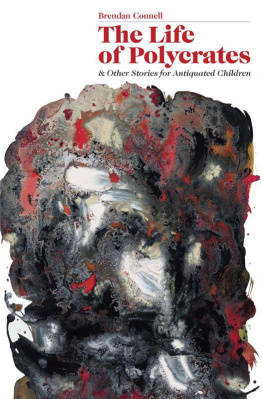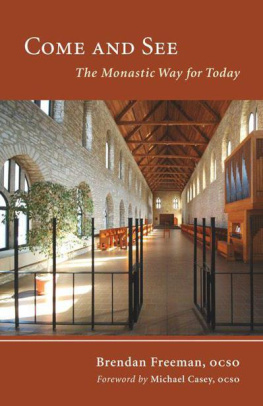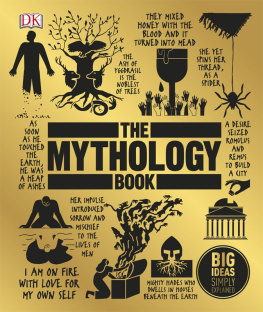
The Life of Polycrates
and
Other Stories for Antiquated Children
The Life of Polycrates
and
Other Stories for Antiquated Children
Brendan Connell
Chmu Press
The Life of Polycrates
and
Other Stories for Antiquated Children
by Brendan Connell
Published by Chmu Press, MMXI
The Life of Polycrates and Other Stories for Antiquated Children copyright Brendan Connell 2011
The right of Brendan Connell to be identified as Author of this
Work has been asserted by him in accordance with the
Copyright, Designs and Patents Act 1988.
Published in March 2011 by Chmu Press.
by arrangement with the author.
All rights reserved by the author.
First Kindle Edition
This book is a work of fiction. Names, characters, places and incidents either are products of the authors imagination or are used fictitiously. Any resemblance to actual events or locales or persons, living or dead, is entirely coincidental.
Design and layout by: Bigeyebrow and Chmu Press
Cover artwork: Head with Turban by John Connell
Artwork photography by John Vokoun
E-mail:
Internet: chomupress.com
for Sujata
Contents
1
2
3
4
5
6
7
8
9
10
11
With them you too, Polycrates,
shall have immortal fame for beauty
as long as my song and fame shall last.
Ibycus
The Oxyrhynchus Papyri
Und wenns die Gtter nicht gewhren,
So acht auf eines Freundes Lehren
Und rufe selbst das Unglck her;
Und was von allen deinen Schtzen
Dein Herz am hchsten mag ergtzen,
Das nimm und wirfs in dieses Meer!
Friedrich Schiller
Der Ring des Polykrates
I.
Chronological Table:
50th Olympiad... Birth of Pythagoras.
52nd Olympiad... Tisander wins at boxing. Amasis becomes Pharaoh of Egypt.
53rd Olympiad... Tisander wins at boxing.
54th Olympiad... Tisander wins at boxing.
55th Olympiad... Tisander wins at boxing. Croesus becomes King of Lydia. Death of Aesop.
56th Olympiad... Nabonidus becomes King of Babylon.
57th Olympiad... Ariston and Anaxandridas are kings of Sparta. Pythagoras invents the octave.
58th Olympiad... Polydor wins at the pankratium. Cyrus, founder of the Persian Empire, defeats King Croesus of Lydia.
59th Olympiad... Echoiax invents fish sauce.
62nd Olympiad... Cyrus dies, and is succeeded by his son Cambyses.
64th Olympiad... Death of Polycrates. Death of Cambyses. Darius becomes King of Persia.
II.
Sigla:
< > conjectural conceptions
[ ] uncertain reading
<< >> scriptural references
{ } offstage comments
III.
Aeaces ruled, together with its city of Samos, the island of Samos, that piece of land in the Icarian Sea, separated from the coast of Ionia by a strait, narrow, less than a mile wide. That tract of solid earths surface, completely surrounded by water and washed by the sea, was for the most part level, but with its share of natural elevations, with Mt. Ampelus, and with fertile soilfigs, pears, grapes, apples and fragrant rose-apples, from that tree of greenish-albumen-tinted flowers, ripened there twice a year; its forests cried with peacocks, and low hills were spotted white with sheep, in places grey-green with olive groves; its circumference was about eighty miles and it had numerous pretty temples, to Zeus Ceravneos, to Apollo Nymphegetes, to Dionysus Dallius Anthestius and to many others, though most notable of all was the Heraion.
Aeaces had three sons, Polycrates, Pantagnotus and Syloson. Polycrates was the oldest, and the heir of Aeaces. He was handsome, had a strong, energetic body and though short of stature was among the best wrestlers on the island. He could swim wellto the Ionian coast and back,run fast, throw the javelin a long distance, lift and hurl great stonesand he won many athletic competitions, was skilful at all sorts of martial feats, hunting, horsemanship and the employment of armsand yet never bragged about his obvious ability.
Quick of comprehension, fully intelligential, from Pherecydes, the son of Babis and teacher of Pythagoras, he learned about the seven parts of the universe and the history of the world. From Phileus, the father of Rhoecus, he learned about the principles of the metallurgical sciences. His tutor in letters was the poet Anacreon, who worshipped with equal fervour Art, Wine and Love, and told his student about the affairs of Asia and his own rather ridiculous adventures [ as spear-for-hire, horseman, composer of ballads and epitaphs for sailors and the slain flower of forces ]. He taught the youth how to play the magdis and sing, beautiful hymns to Artemis, Dionysus and Hera; and the subtleties of language, the various tricks involved in composition and declamation.
Never invent new words, Anacreon said. In public speaking never use strange phrases or antique words that have grown out of use, though both of these, in written works, are not only acceptable, but recommended and should be searched out with zeal; for the former shows you of original mind, the latter one acquainted with the classics and great authors, with Homer, with Pythermus.... Use noble words, an arsenal of words, exquisite wordstreasure up old poems in your mind, for they will add to your compositions a patina of antiquity and to your speech force of expression... with which to forestall objections, ask questions, postpone opponents, marshal proofs and fill their gaps with padding...
Later, upon entering his early manhood, Polycrates travelled. He went across the sea to Crete, the birthplace of Zeus... Cyprus...... visited Egypt, bearing a letter of introduction to Khnem-ib-re, King Amasis, who served his guest wine of Thebes flavoured with petals of violets; feasted him on Nile fish resting beneath blankets of herbs, colocasium, and sesame cakes bathed in honey. Slim, smiling and silent young women fed him candied papyrus piths while groups of minstrels filled the air with exotic song, cymbals and the sound of the twenty-two stringed harp. The king took Polycrates on excursions to Crocodilopolis and Oxyrhinchus; showed off his building projects, his temples, of Isis, Philae, Edfu, Sohag, Koptos and Abydos; in Sais the magnificent gateway to the temple of Athena; and the numerous granite colossi, large man-headed sphinxes, criosphinxes and hierosphinxes, which great artists were carving at his commission.... Then Polycrates visited Babylon, where he was especially impressed with the sewage system and palace privies; the hanging gardens, the dazzling splendour of temple buildings, the shrine of Merodach...... fortification walls and paved processional ways.
IV.
When he returned home Polycrates found that his father had been assassinated and replaced by a hastily composed oligarchy, made up of the heads of the richest families of the island. The usurpers, in order to avert accusations of injustice from the populace, left the sons of Aeaces with lives unthreatened and a patrimony largely intact. Ambitious and desiring the power he considered rightfully his, Polycrates became a popular citizen by giving donations to the poor, who were naturally much more numerous than the rich. He gave fine clothing to the elderly, a meal every day to any Samian who wanted it, and, tearing down the fences that surrounded his orchards and vineyards, let the people pick fruit, figs, pears and grapes, as they wished. When he went out, he was accompanied by a servant carrying a bag of coins, and this man was instructed to distribute the money freely to all who asked for it. He also often contributed toward the expense of funerals, and lent his own couches and goblets, which were quite gorgeous and costly, to be used by anyone who was preparing a marriage-feast or extraordinary entertainment.
Next page










